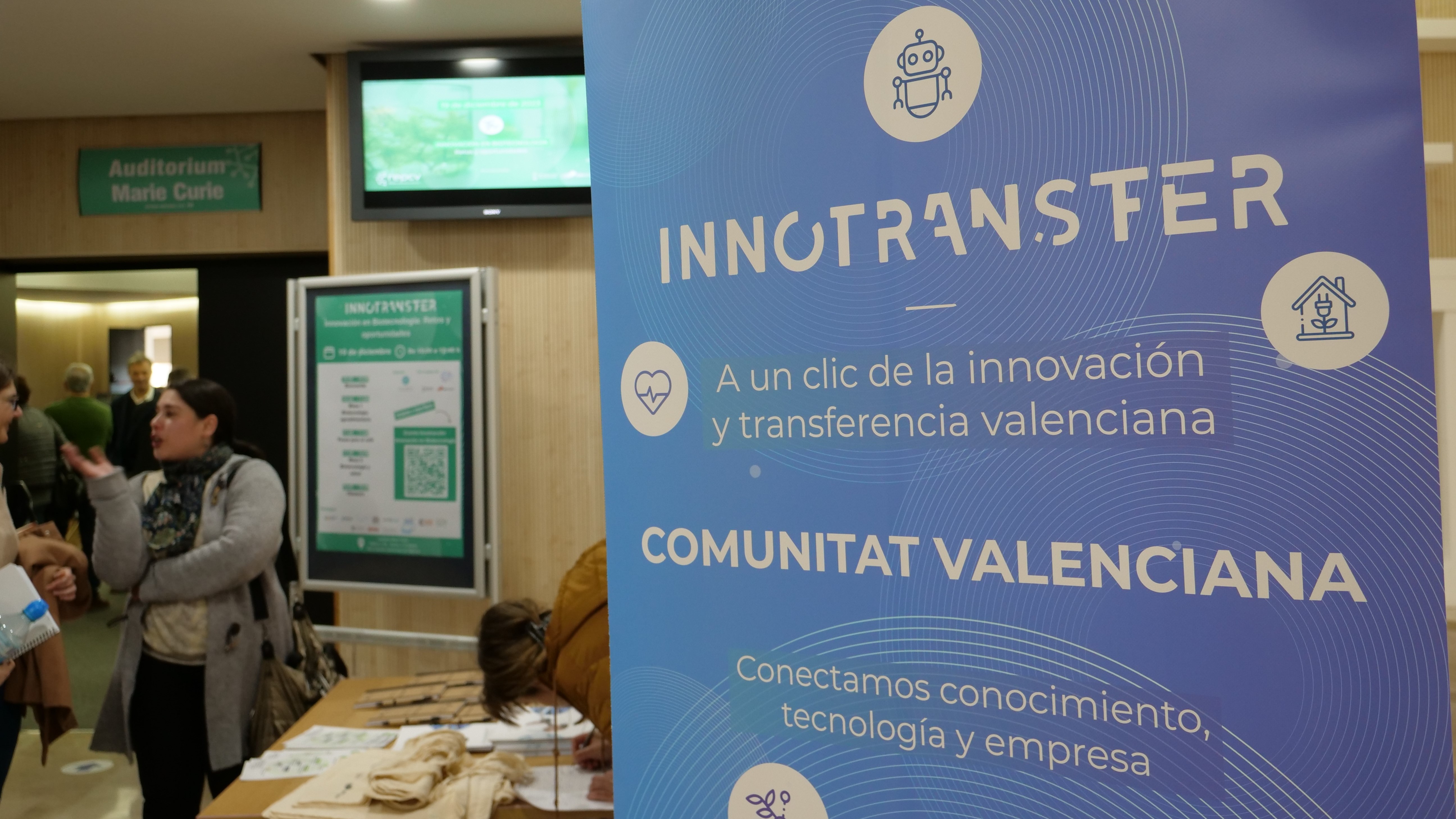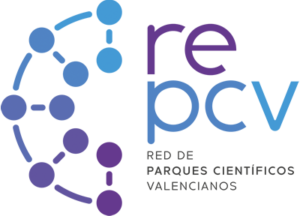Companies, research groups and reference entities in the biotechnology sector analyze the keys to the industry in the fourth event of the year organized by the University of Valencia Science Park (PCUV) in the framework of Innotransfer, an open innovation program promoted by the five Valencian science parks with the support of the Valencian Innovation Agency (AVI)
According to the Strategic Committee for Specialized Innovation (CEIE) of the AVI, the conference responds to the need for innovation in organic and sustainable agriculture, as well as the development of products whose application provides solutions of various kinds.
Biotechnology is a sector that is in a moment of growth. In the Valencian Community, the increase in the number of operations in this field has skyrocketed in recent years, more specifically in areas such as Agri-Food and Health. This situation generated the need to analyze the current context of the region in more depth through the conference Innovation in Biotechnology: Challenges and Opportunities, which was held on December 19 at the Marie Curie Auditorium of the University of Valencia Science Park (PCUV) within the open innovation program Innotransfer, which has the support of the Valencian Innovation Agency (AVI).
In this line, Fernando Mª Zárraga, manager of the University of Valencia Science Park Foundation (FPCUV), gave a welcoming speech in which he highlighted that Biotechnology "has emerged in the contemporary world as a transforming force driving very important advances in medicine and health, in agriculture and in the agri-food industry". "Being a discipline that combines biology, chemistry, engineering and some other scientific branches, it is a subject that is constantly evolving," he stressed.
In addition, the manager of the FPCUV stressed that "the biotechnology sector is a strategic field for our economic development, since it is a growing sector, both in terms of turnover and its high potential for innovation and generation of added value, and what is more important, of quality employment", for which he added, according to data from the Bioval Cluster, "investments in biotechnology in the Valencian Region in the last year have exceeded 250 million euros, of which 70% corresponds to private investment, and 30% to public investment". "With respect to previous years, specifically to the year 2022, in the case of Medicine and Health, an investment of 125 million euros was allocated, an increase of 50%," Zárraga gave as an example.
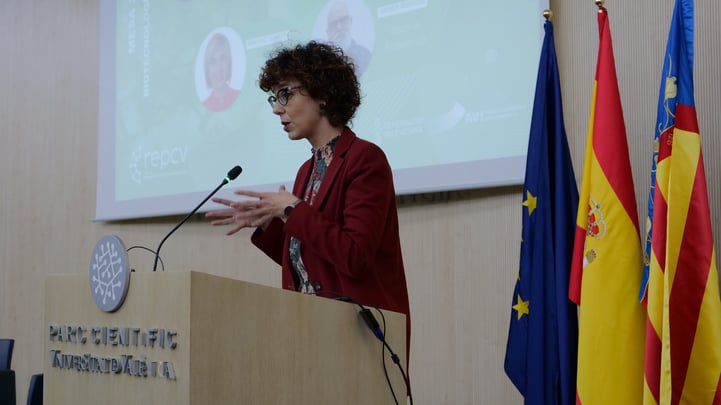
Olivia Estrella, General Secretary of the Agència Valenciana de la Innovació (AVI), during the Innotransfer conference. Photo: FPCUV
In welcoming the day, Olivia Estrella, General Secretary of the Valencian Innovation Agency (AVI), emphasized the support of the AVI to this strategic sector in recent years, and explained that so far they have financed projects in this field for an amount of approximately 26 million euros "in a wide variety of sectors, not only in agri-food or health, but also linked to the circular economy.
She also highlighted the figure of innovation agents, who "are those people who, within the framework of a business association or a technological institute, are in contact with companies or research groups, depending on their origin". She indicated that this is so, "to make sure that they are really attentive to what is happening in the market together with what is happening in the universities and technological institutes". On the other hand, "a step further and linked to the research groups that have a longer track record in transfer, it helps to create with AVI funding, scientific units of business innovation." "I encourage you to take advantage of this session to formalize agreements or seal alliances that are so necessary to respond together to the growing opportunities for innovation that biotechnology is opening up," concluded Estrella.
"I encourage you to take advantage of this session to formalize agreements or seal alliances so necessary to respond together to the growing opportunities for innovation that Biotechnology is opening," Olivia Estrella, General Secretary of the Agència Valenciana de la Innovació (AVI)
Agri-food biotechnology
Biotechnology applied to fields such as agrifood focuses on the use, modification or creation of biological systems and living organisms or their derivatives to obtain healthier, more nutritious and pest- and insecticide-resistant foods. In this context, the Food and Agriculture Organization of the United Nations (FAO) is receptive to the use of biotechnology in this field to meet the needs of an increasingly urbanized and growing world population, but there are also voices against these modifications.
Agustí Aranda, researcher at the iYeastBiotech of the Institute for Integrative Systems Biology (I2SysBio), explained that his group focused its research on "the basic fundamentals of the stress response of yeasts to nutrients," and added that they found "a series of genes that can influence the amount of alcohol in wine fermentation, which is mainly carried out by yeast. "Nowadays, with climate change and rising temperatures, grapes ripen too much and have too much sugar, and that leads to a lot of alcohol, so reducing it is very important," he said, while stressing that "through a series of yeast evolution processes we obtained mutants that were able to lower the ethanol without affecting the acid". He also warned of the difficulty of introducing these "spontaneous mutants" in an industry that he describes as "very traditional". "If it is already complicated to talk about transgenics in other fields, in an industry like wine it is even more so," concluded Aranda.
In this sense, continuing from the field of research, Joan Ferré, Professor of Genetics at the University of Valencia, lamented the fact that "a technology that we have at hand and that we use for many things every day in laboratories, is not allowed to be transferred". In spite of this, Ferré warned that "Europe is importing transgenics, but is prohibiting their cultivation, while Asia, Australia, North America and South America are cultivating them", and also wondered that "if they are so bad, why are we importing them", to which he responded that "we do it because otherwise we would not have feed for livestock". In addition, he stressed that "within plant protection, I have not seen that eagerness of companies to contact us", and in a collaboration they made with a company, "I noticed that I lacked the intermediate bridge to transfer correctly".
"Europe is importing GMOs, but is prohibiting their cultivation, while Asia, Australia, North America and South America are cultivating them", Joan Ferré, Professor of Genetics at the University of Valencia
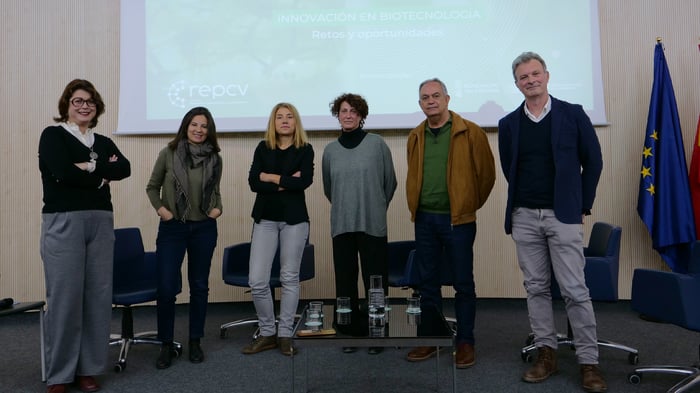 (From left to right) Kristin Suleng, head of Communication and Marketing of the FPCUV; Amparo de Benito, head of AINIA Microbiology projects; Ana Fuentes, FoodUPV researcher; Magdalena Cervera, director of the R&D laboratory of GCM Citrus S.L.; Joan Ferré, professor of Genetics at the Universitat de València; Agustí Aranda, researcher at iYeastBiotech. Photo: FPCUV
(From left to right) Kristin Suleng, head of Communication and Marketing of the FPCUV; Amparo de Benito, head of AINIA Microbiology projects; Ana Fuentes, FoodUPV researcher; Magdalena Cervera, director of the R&D laboratory of GCM Citrus S.L.; Joan Ferré, professor of Genetics at the Universitat de València; Agustí Aranda, researcher at iYeastBiotech. Photo: FPCUV
Magdalena Cervera, director of the R&D laboratory of GCM Citrus S.L., emphasized their interest as a biotechnological breeding laboratory, "in developments with transgenic plants and what they can offer us in terms of knowledge, and the possibility that there could be some development that could be used in the United States or elsewhere where they are regulated". "One of the objectives we have in the laboratory is to use genomic editing using CRISPR/Cas, but the problem is that in citrus, genetic improvement is very complicated," due to the very slow growth processes, Cervera explained. "There are many more companies that are investing in R&D and in such complicated topics as genetic improvement in plants. The companies are there and are eager to invest, to have new developments, to be competitive and sustainable," she said.
On the other hand, the work of Ana Fuentes, FoodUPV researcher, focuses on fermented vegetables. Mainly, in the institute where she works, they are dedicated to the application of biopreservatives, so they are closely linked to the trends in the market. "We work with companies that come to us with specific problems and we have to provide them with a solution," Fuentes adds. As an example, the FoodUPV researcher, pointed to the preservation of fermented products through lactic acid bacteria, in fact, she added that "we no longer go only to the development of the biopreservative agent as a bacteriocin or the bacteria itself, but I cannot forget the combination between the food and the microorganism". "From the point of view of the agri-food industry, the profit margins are very limited. I believe that public funding sources are a good strategy, as they are available to many companies and also bring the university and the industry much closer together," Fuentes concluded.
Finally, Amparo de Benito, head of AINIA Microbiology projects, highlighted five challenges posed from the technology center where she works: food of the future, health and food safety, digital transformation and green transformation. In fact, she pointed out that "we can practically apply biotechnology in each of these challenges, because we can take advantage of these types of technologies to improve biotechnological processes." "We realize that biotechnology is so horizontal that it allows us to act in all areas of work," he added. In this line, de Benito, emphasized the food of the future, and as she explained, "we are developing bio-based additives, since there is more and more pressure to replace synthetic additives with natural additives, but in Spain and in Europe, we come up against the legal aspect".
"From the point of view of the agri-food industry, profit margins are very limited. I think that public funding sources are a good strategy, which are available to many companies and also bring the university and industry much closer together", Ana Fuentes, FoodUPV researcher
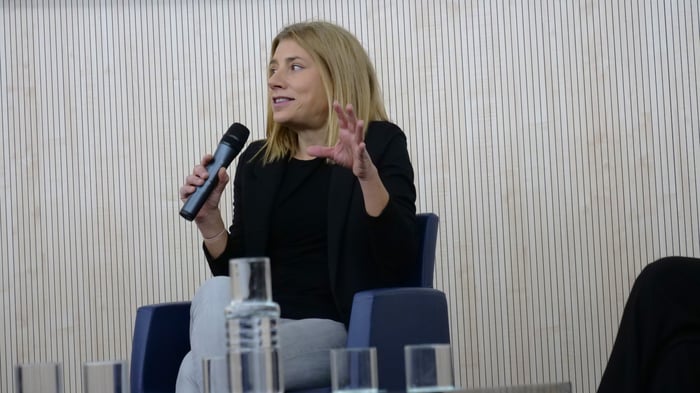 Ana Fuentes, FoodUPV researcher, during one of her interventions at the round table "Agrifood Biology". Photo: FPCUV
Ana Fuentes, FoodUPV researcher, during one of her interventions at the round table "Agrifood Biology". Photo: FPCUV
Biotechnology and health
As regards biotechnology applied to health, representatives such as Salvador Gil, researcher at the Inter-University Research Center for Molecular Recognition and Technological Development (IDM), highlighted the limitations existing in the sector, and, as he pointed out, "when you enter the regulatory area, the problems start". In fact, he explained two examples in which they are working and could have difficulties when it comes to being commercialized. In this sense, David González, CEO Dermaclaim, pointed out that "we find many more limitations in our minds than those that actually occur", although he warned that from his service company, "it is easier to go to market and a much more complex development with more money and time requirements is not needed". "Whoever does not want to take the risk is better not to engage in development," he warned.
Antonio Ferrer, director of the Institute for Research, Development and Innovation in Health Biotechnology of Elche (IDiBE), warned that "sometimes the limitations come from outside", although he explained that in his opinion there is a major limitation, which is "the training of researchers", and he pointed out that "researchers are trained to do very good research, but we are not trained for entrepreneurship. This is something that should be encouraged much more". "Fortunately, the innovation agents and the UCIES have come to stay in the research institutes, centers and departments. I think this has been an important change, because unfortunately the OTRIs have been collapsed with a multitude of other tasks and above all with an increasing complication and administrative tangle when it comes to managing and justifying projects that has prevented them from really devoting themselves to the transfer of technology and research results to society," Ferrer added.
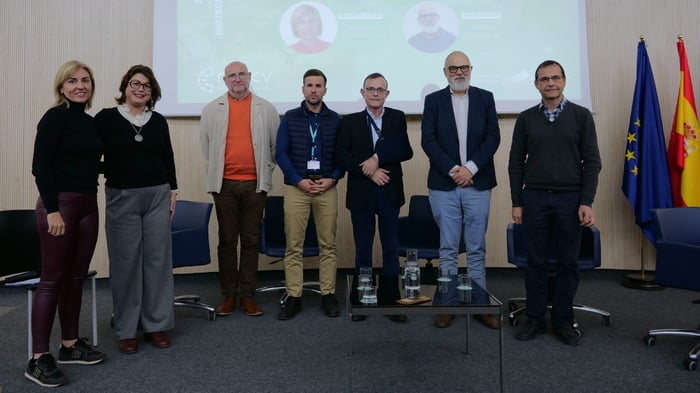 (From left to right) Beatriz Llamusí, co-founder of Arthex Biotech S.L. Kristin Suleng, head of Communication and Marketing of the FPCUV; Salvador Gil, researcher at the Interuniversity Research Institute for Molecular Recognition and Technological Development (IDM); David González, CEO Dermaclaim; Antonio Ferrer, director of the Institute for Research, Development and Innovation in Health Biotechnology of Elche (IDiBE); Javier Burgos, director of Biotransfer UJI; Rubén D Artero, co-founder of Arthex Biotech S.L. Photo: FPCUV
(From left to right) Beatriz Llamusí, co-founder of Arthex Biotech S.L. Kristin Suleng, head of Communication and Marketing of the FPCUV; Salvador Gil, researcher at the Interuniversity Research Institute for Molecular Recognition and Technological Development (IDM); David González, CEO Dermaclaim; Antonio Ferrer, director of the Institute for Research, Development and Innovation in Health Biotechnology of Elche (IDiBE); Javier Burgos, director of Biotransfer UJI; Rubén D Artero, co-founder of Arthex Biotech S.L. Photo: FPCUV
From the point of view of Javier Burgos, director of Biotransfer UJI, funding is one of the most limiting aspects, and although it is "a transversal problem in science, in the field of health it is even more so". "According to data from FarmaIndustria, the average cost of developing a drug is 2,500 million euros, a very high amount, taking into account the annual R&D budgets in this country," he lamented, while adding that "we are in a system in which we need a lot of funding". He also pointed out that "there are few companies that are enough of a driving force to develop the research we do well, since the majority of companies in this country are SMEs, and this is a problem, because this type of company, the first thing it has to do is to think about how to pay the payroll and therefore the R&D developments come later".
In line with Burgos' comments, Rubén Artero, co-founder of ARTHEx Biotech S.L., defended that "the company must have a business model that can receive some subsidies, but it cannot aspire to live off them". In this sense, Artero stressed that when it comes to starting up and launching a company, "one of the most fundamental things is to have a clear business model and a good idea, because if not, companies can be created that may not be the right ones". In addition, he added "one more limitation when creating companies, which is finding entrepreneurs", and that is that "it is very difficult to find people to take charge of a company. This is one of the most limiting things for academic laboratories, because what you have are predocs and postdocs, and only exceptionally someone may be interested in this".
"Researchers are trained to do research very well, but we are not trained for entrepreneurship. This is something that should be encouraged much more", Antonio Ferrer, director of the Institute for Research, Development and Innovation in Health Biotechnology of Elche (IDiBE)
More transfer
Damià Tormo, co-founder of Columbus Venture Partners, put the finishing touch to the last Innotransfer day of 2023. During his speech he delved into the challenges and opportunities of companies that have supported. In addition, he emphasized that "in Spain a lot of high quality science is generated that has a great value, and sometimes, that science that is done here, if it were at MIT or Harvard, they would really be raffling it. What happens is that sometimes we simply don't know how to transmit it or give it the value it deserves". This fact, Tormo pointed out, "generates a great opportunity, because we do not transfer enough", despite "all the science we generate and all the quality projects there are, we do not transfer as many patents as we should". "In the end, all this science has value if we also put it to the use of society, and that is what we see as important, that everything that is being researched has an impact and that it arrives as services and products to improve the lives of patients," he emphasized.
In the Valencia region, Tormo highlighted the case of ARTHEx Biotech, a company located in the Parc Científic. "This is one of the most exciting things we have seen since Columbus. We think it's going to be a great success, because in the end there is a problem for patients with muscular dystrophy 1, and ARTHEx's technology is going to allow those patients to be treated with something that is much, much safer than what is being developed right now. For me it is a success story of science to come," he concluded.
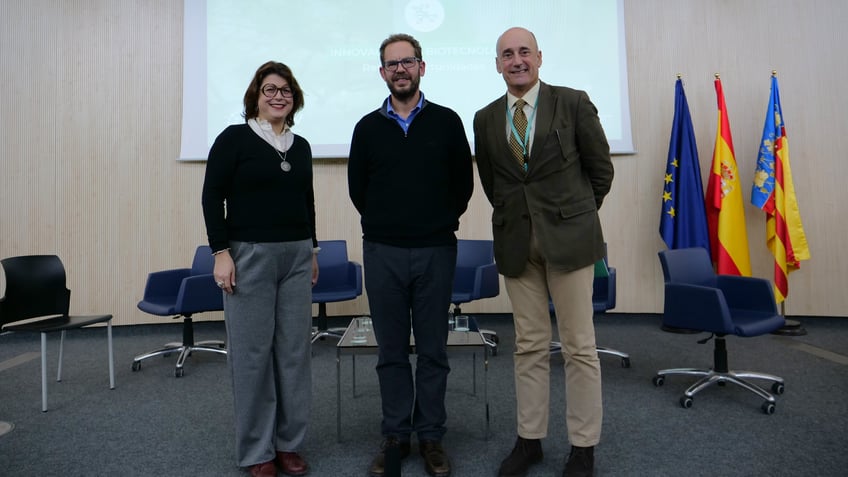 (Left to right) Kristin Suleng, head of Communication and Marketing of the FPCUV; Damià Tormo, co-founder Columbus Venture Partners Fernando Mª Zárraga, manager of the FPCUV; Pedro Carrasco, director of the PCUV; Rafael Marimón, professor of Commercial Law at the UV; . Photo: FPCUV
(Left to right) Kristin Suleng, head of Communication and Marketing of the FPCUV; Damià Tormo, co-founder Columbus Venture Partners Fernando Mª Zárraga, manager of the FPCUV; Pedro Carrasco, director of the PCUV; Rafael Marimón, professor of Commercial Law at the UV; . Photo: FPCUV
With the support of:


